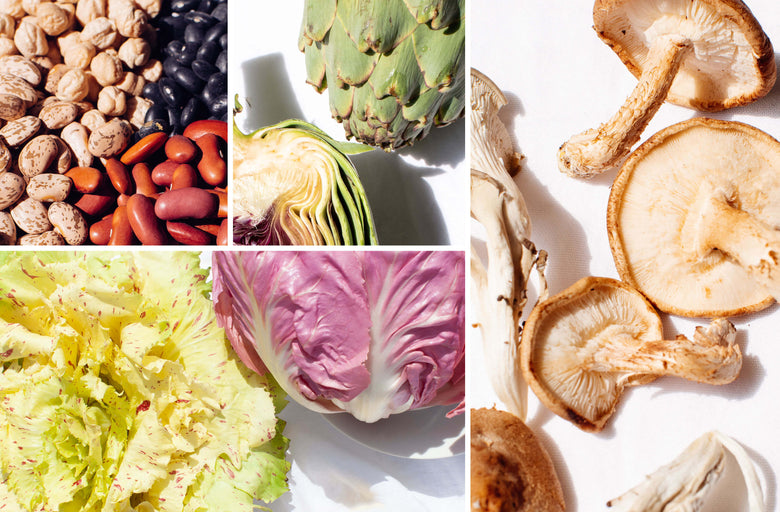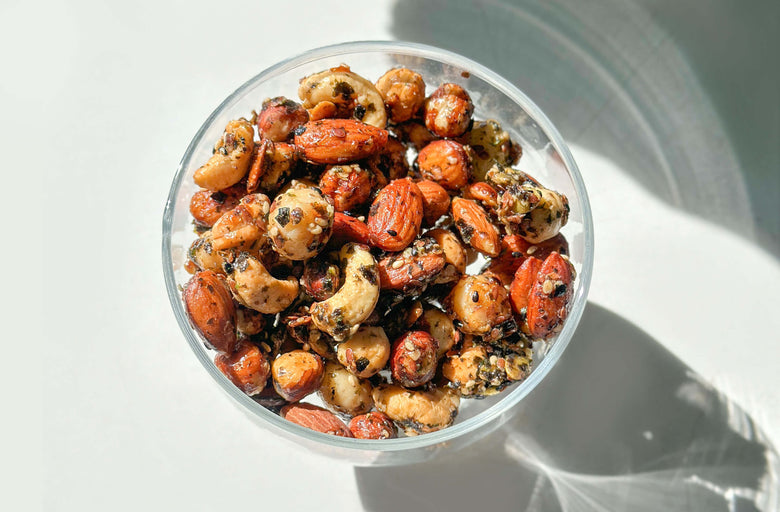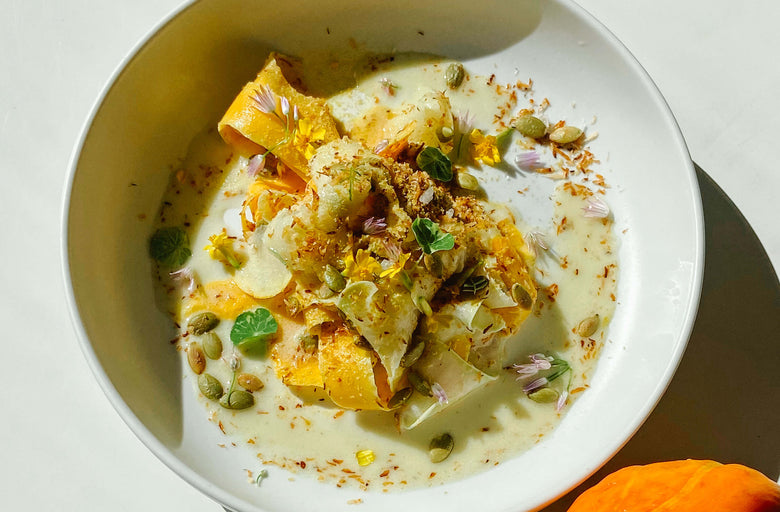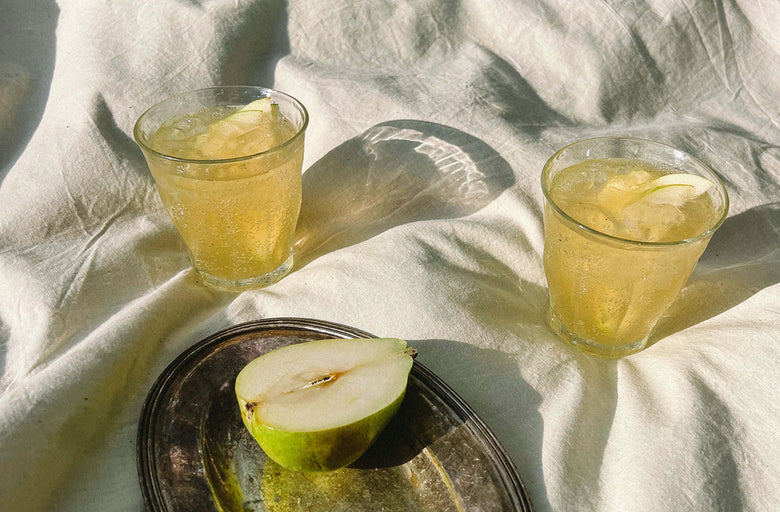Tata Harper is not just a pioneer in green skincare and beauty, but the pioneer, in green skincare and beauty. Her 'Vermont-farm-meets-European-bio-technology' products are the most delicious all-natural goods to ever touch our skin, and we're ever-grateful to her for the road that it took her to get here. This working mama of three totally radiates (more like GLOWS) with health, warmth, and passion for the environment and every living being. Read for more on how this Colombian became the spokesperson for wellness beyond food and exercise and created farm to face skincare...

How did you get into green skincare and beauty? Was that part of your upbringing?
I’m from Colombia, and people from that country are really the epitome of Latin culture — it’s a lot of dancing and happy people on the coast of the Caribbean. It was fun growing up there because they have such a dedication to beauty. I grew up in a household with a lot of women — we’re a total of 35 cousins, and 20 of those are women. I grew up immersed in a world of loving beauty, and really seeing beauty not as a luxury, but as a necessity and something that you have to do every day, just like brushing your teeth.
My grandmother was especially obsessed with beauty and every Saturday morning, she would host spa parties in her house and invite all of these women to come try her hair mask or body scrub. She’d do saunas, baths, manis and pedis and blowouts. And after that, you were set for the weekend. I would wake up early on Saturday mornings and help her prepare some concoctions that were pretty basic, but had come from generation to generation in her family through her mom. We’d do oatmeal masks and lots of oils for the hair. It was all about the ritual and getting together to beautify.
Then, I took this road of being an entrepreneur in beauty. I never thought that I would be in beauty, even though I’ve always loved it. I’ve also always had a really extensive regimen, and my brand really happened by necessity. Once my step father got diagnosed with cancer, he ended up being treated here in the U.S. and I was the person that accompanied him to a lot of his doctors and medical centers. He tried a lot of stuff — the Ayurvedic doctor, the herbalist — and what I took out of that, is the learning of the holistic lifestyle. How you live your life affects how you age and how your body reacts to all of the things that you’re bombarding it with on a daily basis.
I remember doctors talking to my stepfather about this concept of “toxic load” — meaning, you should pay attention to your daily toxins and the things that you eat and the things that you put on your skin. He’s a cancer survivor now, and he’s changed so many things, especially his eating. And when he was changing, my family and I were changing with him.
Over the past decade and a half, we’ve all been on a journey of discovering health and wellness in a different way. It use to be about making sure you were always exercising, and diet was about not consuming too much cholesterol. We didn’t consider the things that we do now as part of a worldwide wellness movement. Now, we’re not just thinking about exercise, but we’re cross-training into multiple different exercises. We’re not just eating healthy, but we’re considering if the food is local and how it’s been grown. Now, it’s about being mindful of what you put on your body and into your environment, too.
For a lot of people, health begins with controlling what they eat, but then the next phase is for them to move into questioning what they’re cleaning their hair with, what their brushing their teeth with, and what they’re cleaning their house with. We live in a new era where there’s a lot to consider. We have to investigate every part of life today, because ignorance is not bliss. It’s about taking personal responsibility of the things that you put on your skin and on your body.
And that’s how it all started for me. But then, I got really frustrated because I couldn’t find what I wanted. First, I changed my diet, and then my house cleaning products. Then I got pregnant, and it was all about the baby stuff. Skincare was the last frontier for me. The few all-natural things that I’d tried in the past hadn’t given me any real results. I wasn’t satisfied with their quality or the way that they felt and smelled. I remember having to go buy all-natural products in supermarkets, but they didn’t have the highest quality anti-aging ingredients. I could definitely find things that were better, but they weren’t really high tech, which is what you want when you’re dealing with skincare. And in the typical beauty boutiques and department stores, I was noticing products that had things like algae and roses and different herbal extracts, but then you’d turn the box around and see 50 other industrial chemicals and parabens. I remember going home and googling what polypropylene glycol was, and I was like, ‘Oh my god, it’s antifreeze! Why is there antifreeze in the eye cream that I use every day?!’ Turns out that these ingredients are forms of battery acid that are used to emulsify products. They’re not the ingredients that give you results, but they’re the ingredients that are there to preserve the formula. They don’t do anything for your wrinkles — they’re just there to make the product last for five yeas.
Then out of this sheer need, I was like, ‘I can’t be the only woman looking for something that gives results, and a regimen that’s completely clean but also has the best raw materials from around the world — not just one or two.’ I started to work on a line that was totally different, which is what we have now. It’s a line that is completely pure, has zero synthetic chemicals and doesn’t revolve around just one active ingredient, but has many — our serums have from 29 to 38 actives. They’re very, very concentrated. And they don’t necessarily have to do just with the ingredients that I grow on the farm. We bring in technology from 48 different countries from around the world, so anytime you buy our products, you’re buying global technology that is relevant today.
Of course we grow some things on the farm to add to the products, but they’re not the pillars of the anti-aging backbone of our formulations. They’re things like calendula, which is soothing; arnica that helps with inflammation; alfalfa to help with oxygenation; borage for all of it’s high nutritional content and vitamins; and meadowsweet, which is a natural source of salicylic acid to help with cellular turnover. On the farm, we make a complex that has all those herbs and we macerate them into this really powerful oil that goes into every single product. We mix that with technology that comes from Israel, Germany, the Czech Republic, Egypt, Tasmania, Madagascar, Crete…every place you can imagine.
I was reading about aromatherapy, Ayurvedic medicine, Chinese medicine, and homeopathic extracts. I ended up consulting with a lot of the authors from those books to create concoctions, so I’ve now incorporated disciplines from many, many cultures. And that’s how we’ve ended up with ingredients from so many countries around the world. It’s not necessarily about where I’m from or what I grow on my farm, but it’s about what the best thing out there is for my clients.
And that’s how it all evolved — but it was a journey full of obstacles and challenges. From the beginning, everything was, ‘No, you’re crazy. You cannot do this. What you want to make is impossible. Who do you think you are?’ It was really hard to make it all happen. It was really about persistence, and just staying very motivated. It was about making products that, for the first time, are really natural and unique, but that are also very technologically driven.

Can you tell us about your life on the farm?
The Vermont farm happened way before this company was even on the horizon. We’ve had it for almost 14 years now. My husband and I were living in Miami at the time, and used it as our weekend spot with friends. We would go there almost every other weekend. It was always a dream for me to live there. Then we moved from Miami to New York, but I ended up never really moving to New York.
When I was there, I really started to work on a lot of the formulations, and it gave me time to get inspired to make it all happen. I figured out what to use from the farm once I started consulting with a couple skin biologists. Then I consulted a couple herbalists in Vermont about what herbs grow well on the land, and that’s how we came up with our list, and that’s when we were like, ‘This is the soil where such and such grows really fast, so let’s focus on those as our base for products.’ That way, something from the farm is always used in the products.
How do you stay up to date on new technology and science in skincare?
Through the chemists I collaborate with, especially in Europe. I’m also in touch with a lot of cosmetic labs and the people that make ingredients. I make some ingredients on my farm, but the rest is biotech. It’s things that are grown in cell cultures — they take a plant and replicate it in cell cultures, or they ferment. The fermentation business is huge in bio-technology, and the Germans are really good in liposome technology. I’m always attending a lot of shows, traveling around and seeing what they have, as well as sitting down and looking at clinicals. I read a lot of cosmetic journals when I’m on planes.
I work with a lot of chemists and consultants. I also go to visit a lot of labs. I go to a lot of trade shows from around the world where I’m keeping up with the latest research, ingredients and technology. And the nice thing is that now, the majority of cutting edge technology actually comes from natural ingredients, so it’s not necessarily about the synthetics anymore. Labs have invested a lot of money in figuring out what the best different results are that you can get out of plants and with nature. It’s about seeing all the potential that exists in plants, and that’s really exciting.

Is it important for you to keep your customers educated?
It’s such a privilege to be doing what I’m doing and making people feel beautiful. One of the missions of my company is to educate, because if I had never gone through this personal experience with my stepfather, I wouldn’t be sitting here today and doing what I’m doing. For me, educating people about this and being really outspoken is the key. A lot of people think about what they eat, and about what exercise they do, but they rarely think about what they’re putting on their skin. I need to educate people about that. With what you eat, you have your liver helping to do a lot of sorting through, but when you put things topically, they go into the body trans-dermally — things start accumulating in fatty deposits and tissues. From the studies I’ve read, that’s where a lot of mutations start happening. We’re going to be doing more educational videos coming up, so that’s exciting. And also we provide a lot of education in master classes for stores.
The Tata Harper products have such a gorgeous aesthetic that are more luxury than what's associated with all-natural, clean beauty products, how did that come to be?
When I was designing and starting the company, I was so focused on formulation and what was going to be in the bottle, the technology that we were going to use, and what the different products were that we needed to create. The products that we started with — which was a total of twelve — was just my personal regimen. It was a cleanser, exfoliator, essence, serum, moisturizer, eye cream, face oil, resurfacing mask, body oil, body lotion, and a few aromatherapies.
I put so much energy into that, and then I started doing a lot of spa parties at people’s houses just to see what people actually had to say, other than me and my chemists. I wanted to know what they were thinking. I started doing spa parties in Malibu and Brentwood and NYC. People started calling me being like, ‘Tata where can I get this product?!’ I had no idea what to do about the packaging, so my first packaging was really last minute. Then Vogue called and wanted to do a feature, which ended up being a four page article that came out when we first launched. It was really basic, all glass packaging. I knew that I wanted to do it all sustainable because I think about that stuff all the time. I want to make sure that we’re doing business in the right way for the future, because I have kids. I don’t want to be wasteful. I knew that I wanted to do all glass because glass is infinitely recyclable. I knew that I wanted to minimize plastic waste. I knew that I wanted my boxes to be 100% post-consumer fiber so that we’re not killing trees to make a box that people are just going to throw away the minute they walk into their house.
We put something together really quickly, and then a year later when we launched at Neiman’s was when I really had to think about packaging more and create something that was representative of the formulations inside. I knew that I wanted to bring a little bit of the spirit of the farm to the look, because that’s where the products were birthed. That’s why the packaging is now green, because in the summer, Vermont is neon green and full of yellow dandelions. I wanted it to look like the horizon where green and yellow are intertwined. And all of the flowers there were the inspiration behind our logo — it’s a crown of flowers. And our bottles are now made in a mold that’s custom to us, and our airless packaging is the first glass airless packaging in the world — it’s made out of Italy.
Going back to your personal regime, can you give us some suggestions on what we should be doing every day?
I’m 40 and have dry skin, so my skincare routine is different than somebody in their 20’s who’s oily. However, I do think that there are certain steps that you should follow regardless of your skin type or your specific issues. You need to exfoliate every day. I’m huge on exfoliation, and I use our Regenerating Cleanser on dry skin every morning.
When your skin is exfoliated, you’ll notice that your products will penetrate much better and you’ll be glowing. I feel that healthy, glowing skin is the best accessory. I think a lot of people, especially here in the U.S., love to do a lot of make up steps — they want to use a cleanser and a moisturizer, and then pack in all the make up to cover up whatever is going on, instead of repairing it. But I’d rather balance things out. I think if we could actually spend more time with our beauty products, we’d need less make up. The first thing that happened for me and my skin regimen was that I stopped using so much makeup. Latin women are huge in the makeup category. I was always light on it, but I did always have a tinted moisturizer or foundation. Now, I don’t even need any of that stuff.
I say, cleanse and exfoliate every morning. I love to do an essence right after I exfoliate — I really saturate my face with our Hydrating Floral Essence or the Concentrated Brightening Essence. With skin still wet from the essence, I do a serum. Then I moisturize, do the eye cream, and put on a few drops of the Replenishing Nutrient Complex all over. It sounds like a lot, but all of that takes maybe one minute.
At night, I like to double cleanse. I start with a face oil like the Nourishing Oil Cleanser to remove any make up and build up. I just massage it all in, soften any mascara, and rinse it with water. After that, I pat my skin dry and do our Purifying Cleanser, which is incredible for pollution because pollution is is the invisible enemy that we all know is attacking our skin, especially here in New York City. Purification products for people that live here is key. Then, I love to do the Concentrated Brightening Essence for night, and I’ll do three serums — the Elixir Serum, the Boosted Contouring, which I put on my neck, and then the Concentrated Brightening on my chest. Than I do a moisturizer and the Eye Elixir.
I think that people should adjust their regimen depending on the weather and the climate that they live in. If you’re in a very dry climate, then obviously moisturizing becomes the most important. And during the summer if you’re trying to stay more matte, then eliminating a day moisturizer and focusing more on the serum and the essence works well. More masking should happen during the summertime when you’re exposed to the sun and there’s more build up.

Where do you stand on sunscreen debate?
Sunscreen is very important. Though I do have to say, it’s my biggest beauty sin, because I don’t wear it every day. But I’m not out in the sun all the time. If I am going to be in the sun, I definitely at least have a hat. I don’t spend a lot of time walking around, but if that were the case, I would be using sunscreen everyday. It’s critical because the sun destroys the skin. The sun is literally a jolt of energy, so what happens, is that the sun rays become so potent that our skin cells can’t handle it and they just explode. Then, equally as important is to shield yourself from pollution, because pollution ages you as much as UV rays. So using products that help drain toxins is amazing — I love our Purifying Mask and Purifying Cleanser for draining the lymphatic system to help rid of accumulated toxins. They’ll also help rid of any particles that have accumulated in the upper layer of the skin. With pollution, it’s really about looking for products that will help you rid of tiny pollution particles from the air.
Do you think that consumers will ever accept that all beauty products should be clean, and start rejecting traditional brands?
That is definitely the future. In a couple years, I don’t see anyone being like, ‘Give me more antifreeze in my eye cream, please!’ Why would you?! It’s just a matter of ignorance, and deciding to become fully aware, which I feel is happening with this whole natural beauty movement around the world. We’re all trying to look better one way or another — eating better, putting better products on our body, buying better things, and putting forward the companies that are doing better things for the planet. There are so many things you can do to improve how you live your life, and I believe that that’s going the be the future. I don’t think that generation will be embracing chemicals the way that we did when we were younger. We’re going to be like, ‘Hey, remember when there was antifreeze in eye cream? What were we even thinking?’
So many people say that they spend so much money and effort into having really healthy, organic food, and they won’t compromise on that. So why wouldn’t they do the same thing for their skin? It’s the same idea. Since your skin is your largest organ, why wouldn’t you be conscious in using natural ingredients?
What are some of your favorite natural home remedies?
I love to supplement. Not that I think supplements should replace food, but it just helps take things further. For example, I think that algaes are amazing! I love blue green algae, specifically for detoxifying the system and stress control. Algaes are especially suitable for people that are used to doing a lot of exercise and accumulate a lot of stress on a regular basis.
I also love turmeric and chlorella — together, they’re one of the best combinations for detoxification. And magnesium for the nervous system and digestion. Magnesium helps to brings a lot of water into the intestines and keeps things flowing. Flax seed oil and evening primrose oil are amazing for the skin and joints, especially if you have psoriasis. Omega 7, which is the omega for your skin, is great, and eating a lot of fruit and vegetables that are high in beta carotene and vitamin C. And the most important thing is to drink a lot of water — a lot, a lot. I know it sounds cliche, but it is so important to flush fluids out. Your body needs at least three liters of water every day, at a minimum, to keep everything functioning.
What’s really solved the water thing for me is getting a big glass beaker bottle and drinking it all throughout the day. I have it in the morning, go fill it up again at lunch, and make sure I drink all of it. I don’t leave the office without it being gone, and then at night when I get home, I’ll drink maybe two more.

What’s your idea of legacy?
I think that legacy is about the trail that you leave behind with your actions that you do in every day life — it’s that mark that you leave with the little things. I hope that I leave a legacy of a cleaner beauty regimen for all women, so that we can all be beautiful and stay healthy, and happy. And I know that it is possible — it’s just a matter of wanting to make it happen.
It’s important to dedicate time to making it happen for yourself by researching products to help you achieve those goals. I hope that that’s my legacy on this planet. That’s the kind of rent I want to pay for getting to live here. It’s my contribution back to society, in a way.
Natural beauty is truly the ultimate luxury, and a lot of times, people don’t see it that way because, just like it was for me, their first experience with natural beauty isn’t necessarily the best experience. People think that all-natural beauty is all the same, but really, it’s not — just like all synthetic products are not the same. Quality does matter and plays a huge role in the results you get, on the experience you have, and just the way that you feel about it. I would love to change people’s perception of natural beauty, because when it’s done right, it really is the ultimate luxury that you can do for yourself.






